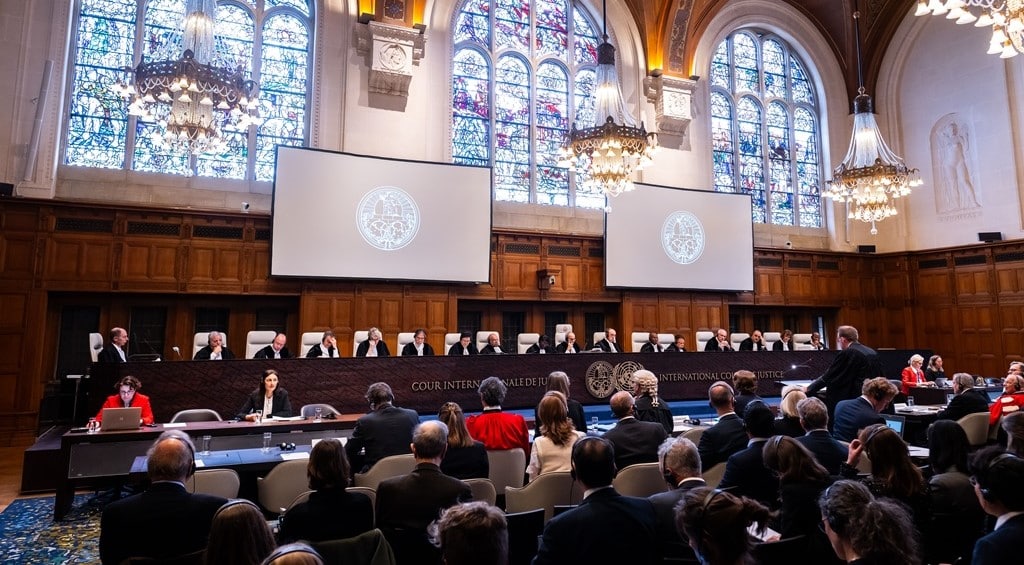7 de julio 2019

ICJ Rules Against Nicaragua's Request For Germany to Halt Arms Sales to Israel

PUBLICIDAD 1M
PUBLICIDAD 4D
PUBLICIDAD 5D
Lay-offs and reduced sales are the common denominators for business, industry and the financial sector.

“The most difficult element for any investor is uncertainty. Every investment requires a time period for generating wealth. Without private – and state – investment, there’s no progress,” points out Alfredo Lacayo, executive director of Lacteos Centroamericanos S.A. [Central American Dairy Company]. Lacayo is the only large business owner who agreed to use his name for this article.
The rest – including consultants in business administration, company managers, and Chamber of Commerce directors – asked to remain anonymous, for fear of becoming objects of government reprisals that could deepen their difficulties.
The sixth report of the Nicaraguan Economic Activity Monitor, elaborated by the Nicaraguan Foundation for Economic and Social Development (Funides), in collaboration with the Superior Council of Private Enterprise (Cosep), details the damage caused by the tax reform and the recent reforms to Social Security. The companies that responded to their questionnaire indicated that “the principal strategies and measures taken include reductions in costs and productive structure; additional lay-offs; partial transfer of higher costs to prices; purchase of raw materials at lower prices; and changes in the business model.”
Less and less milk
Lacayo from the dairy company admits that they’re doing everything possible to keep their balance sheet “in the black”, but that “this last year has been difficult,” to the point of seeing a 12% reduction in consumption of his product.
At the other end of the balance sheet, he warns of an accelerated increase in costs, “due to the cascade effect” of the fiscal reform, which he notes comes “in several waves”. “When they raise your taxes, you calculate the costs based on the direct effects, but later, the raw material becomes more expensive, because the reforms also affected the suppliers; still later, your sales volumes decline, because there’s more unemployment,” he details.
Since his is a large company that also exports, the option to abandon the formal market isn’t on the table. That’s not the case, though, for many of the small suppliers he works with. These have asked him to “operate outside the system, so as to avoid the taxes. They want to sell us ‘under the table’. Since we can’t accept this, we’ve lost suppliers who prefer to work outside the formal market.”
The result is that they’re buying less raw milk, and so they’re producing less packaged milk. They’ve substituted more mixed dairy products, in line with the changes in demand, in which people buy more of the cheaper dairy mixes and less milk. Customers also show a preference for the pint containers because they have less money to spend, even on food.
This marketing strategy also involves giving up on new products that have just gone onto the market. “We’re discontinuing these to concentrate on products with greater demand.” With this, we also save warehousing costs, Lacayo explains.
Some other product lines that also were cut were those whose tax is “very unclear, such as orange juice, which was taxed at a rate nearly 500% greater than before.” The result of this could be that we end up having more imported products than those elaborated locally.
The production plants have also suffered changes. Most notably, there are fewer personnel (the payroll was “lightened” by 45%), and the remaining workers have reduced hours, more forced idle time (with no vacation pay), and they produce less. Where previously they worked six days a week, now they work only four, and no one works or receives overtime.
It’s true that the long-awaited solar energy project has recently entered into service, and this has allowed them to cut electricity costs by 50%. They’ve also arranged to consume less energy by diminishing the use of air conditioning and making more efficient use of their machinery.
Finally, they’ve increased the third-party contracts for other services, such as transport to certain areas of the country where the amount consumed isn’t enough to justify sending out a truck full of products that won’t sell.
Sales fall around the country
Three sales managers of businesses that deal in products of mass consumption, such as inputs for farm production, all painted similar pictures. The common denominator is lower sales and a sense of asphyxiation sparked by the noose of the reforms that “have killed off industry”, as one of them graphically described.
This source, who spoke to us anonymously, helps manage the local branch of a multinational corporation with presence in the country. He explained: “the distributors were left without any working capital and without financing.”
The solution they’re adopting is to import less, even though this makes it more difficult to comply with the orders they receive. The source alleged that some colleagues in other businesses have decided to use “alternative measures”, like factoring [according to Wikipedia, “factoring is a financial transaction and a type of debtor finance in which a business sells its accounts receivable to a third party at a discount.”] “in order to be able to cover the costs of importing and distributing”.
Like the managers above, companies in the commercial sales area have also had to reduce personnel during the last year and a half, and those that had contracted temporary personnel have had to stop doing so.
This source, the manager of a business group within Cosep, only agreed to speak to us after receiving authorization from the president of their business chamber. They then stated that in order to reduce operating costs, companies have had to reduce or eliminate employee benefits, at the same time that they cut back on their advertising and marketing funds.
Depending on the type of products, some have had to revise their portfolios to see which product lines are still profitable and which aren’t, optimizing their inventories and reducing their imports, all of which have caused a lengthening of their delivery times.
Simplifying the distribution routes means that instead of directly supplying ten small grocery stores as they used to do, now they only supply six or seven. Whenever possible, they deliver the product to wholesalers who in turn redistribute the product to the remaining stores.
The companies that sell inputs for production have held out as much as possible without letting their personnel go. They’ve cut costs in other ways, including cutting pensions for retirees, but the continual drop in sales – this sector expects an additional drop of 25% for the second trimester – in the end forced them to lay off valued and experienced workers. Their absence will affect their businesses’ efficiency still more.
An academic consulted by Confidencial, explained that Daniel Ortega’s administration preferred to “tax income and not profits, because they know that many companies will see a great drop in their profits. So, in that way, the government is assured of obtaining some tax revenue.”
As confirmed by the managers we spoke with, this academic’s general prediction was for “more activity moving outside the formal market and more precariousness. Many companies will find it’s no longer good for them to operate as formal businesses, because they’ll then face greater costs in terms of taxes and Social Security quotas. So, the only thing that the government has achieved is to assure themselves of collecting fewer taxes,” the academic foresaw.
Financial system closes branch offices
The head of a micro-finance agency under the regulation of the Bank Superintendent, told Confidencial that the formula they’re applying in 2019 is a continuation of the one they applied in 2018: saving on costs and restructuring loans.
In order to apply the first, you don’t need to have graduated with honors from any business school. Common sense is enough, although in this case, the key is to know how much to tighten the screws and where to tighten the belt.
Last year, they adopted measures to save on electricity and office supplies. They bought fewer new machines, they reduced investments, and they sold off unnecessary equipment and vehicles, thus achieving a savings of 22%. This year, they’ll continue these policies in hopes of saving another 15% in 2019.
Still more painful, the company now employs 20% fewer people than it did 13 months ago: 7% were laid off, and another 13% were people who left the country. The company took advantage of this fact to freeze the positions. “We revised our costs, by arranging to do the same work with fewer people,” the manager stated.
In addition, they closed nearly 10% of their branches in the country, in order to maintain their overall capacity to attend to their clients within a timeframe that is still productive. In contrast, they note that a competitor company has closed 62.5% of their offices. This manager, though, has assumed the job of applying a basic measure of “financial engineering” to maintain a high-quality loan portfolio.
“We’re restructuring the debts of the clients in default, broadening their timelines so that they can pay,” in order to avoid having to enter these as defaults in their accounting, as the norms of the Bank Superintendent’s office and the National Micro-finance Commission orders.
The strategy is simple: from the moment that a loan is restructured, technically that client is no longer in default.
The other part of their business, that of awarding credits, continues functioning in a partial manner. “Our portfolio placements have been cut back a third from what they were before the crisis,” he admits.
The selection criteria haven’t varied, but the clients’ solvency has: they’ve lost on average of 40-50% of their sales in areas such as commerce, services and tourism. This causes them to default, and to cease being subjects of credit.
Thank you for reading our English section, brought to you in collaboration with Havana Times. If you wish to subscribe to our English Weekly Newsletter, you can do it here. Please spread the word and share this link with your friends, family or contacts.
Regards,
Archivado como:
PUBLICIDAD 3M
Periodista nicaragüense, exiliado en Costa Rica. Durante más de veinte años se ha desempeñado en CONFIDENCIAL como periodista de Economía. Antes trabajó en el semanario La Crónica, el diario La Prensa y El Nuevo Diario. Además, ha publicado en el Diario de Hoy, de El Salvador. Ha ganado en dos ocasiones el Premio a la Excelencia en Periodismo Pedro Joaquín Chamorro Cardenal, en Nicaragua.
PUBLICIDAD 3D